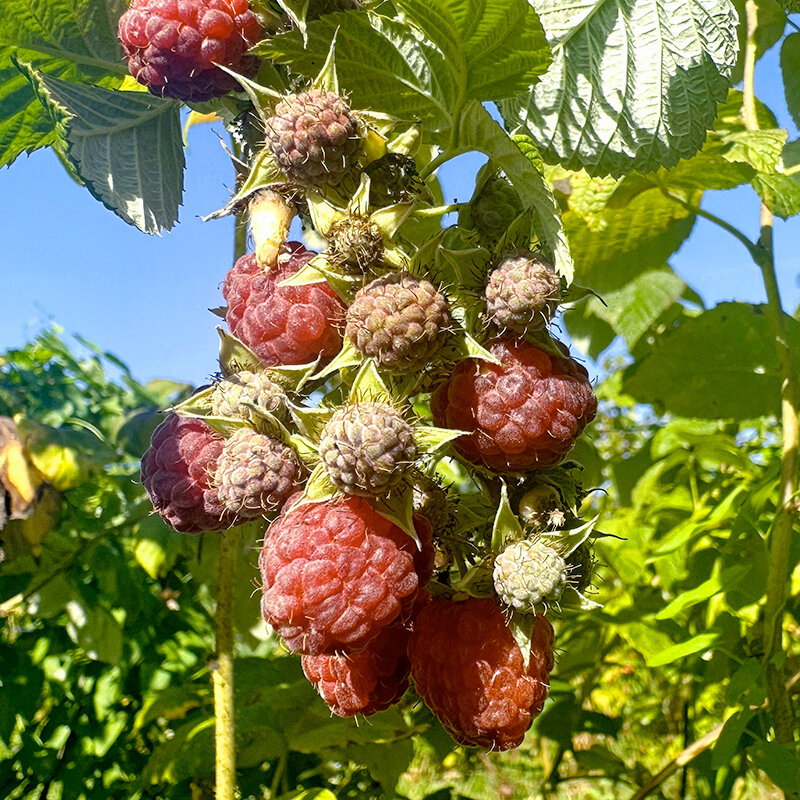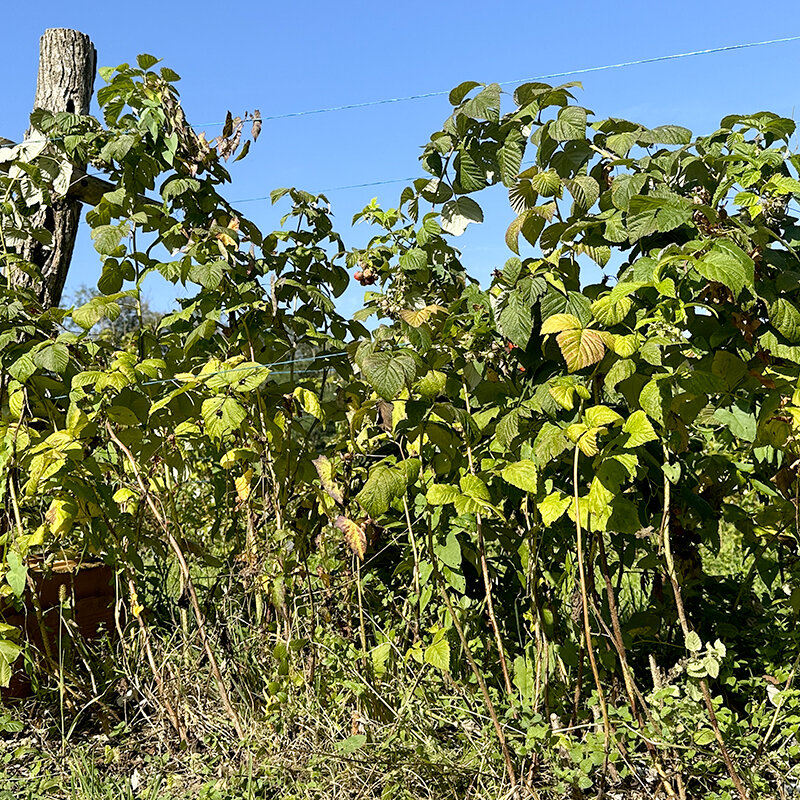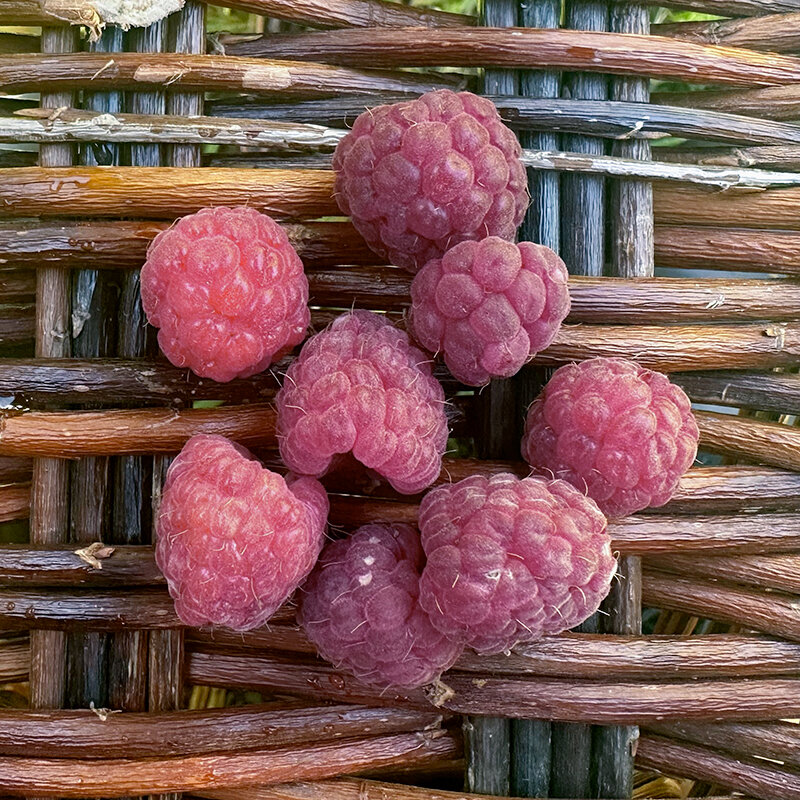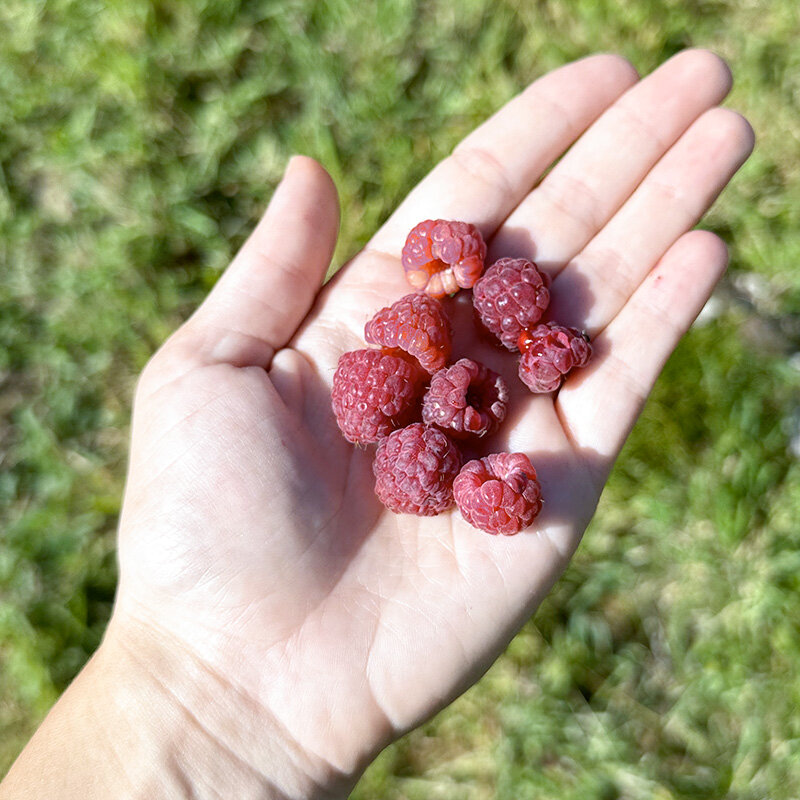Framboisier Tardif "Baron de Wavre" 2 organic plants
Grow delicious, sweet gems with these raspberry plants for an explosion of color and flavor in your garden.
This Swiss remontant variety, one of the latest to appear, produces an abundance of very large, dark-red fruit ofexcellent taste quality. Harvesting takes place from September to November on current-year stems, and in June on one-year-old stems.
The productive"Baron de Wavre" variety is particularly well-suited to jams and pastries.
HOW TO GROW "BARON DE WAVRE" RASPBERRY PLANTS?
Plant raspberry bushes in late autumn, fromOctober to November, in a sunny spot sheltered from strong winds, except in warmer regions where they should be planted in a semi-shaded spot.
Choose light, fresh, non-calcareous soil, with a covering of dead leaves or shredded twigs.
Apply a generous dose of compost or well-decomposed manure a month before planting.
Although raspberries can be grown as isolated bushes in the garden, they are generally trellised:
- dig a trench 15 to 25 cm wide and 8 to 10 cm deep ;
- place a plant every 45 to 50 cm, taking care to spread out the roots;
- cover with soil and press lightly around the plants with your foot;
- cut back each plant above a good bud, 20 to 30 cm from the ground;
- securely install a 2.5 m-high post at each end of the raspberry row;
- stretch 2 galvanized wires between the posts, 90 cm and 1.7 m above the ground
- tie the raspberry branches to the wires with flexible ties.
Raspberry plants can also be trained using a double trellis system. In this case, install right-angled ties on each post 1.2 m above ground level. Stretch the wires parallel to each end of the crosspieces. The plants are then contained between the wires, avoiding the need for tying.
HOW TO CARE FOR "BARON DE WAVRE" RASPBERRY PLANTS?
To care for your raspberry plants and ensure abundant harvests:
- regularly replenish the raspberry plantcover with leaf litter, compost or potting soil to prevent evaporation and keep the soil cool;
- water generously in summer during dry spells;
- weed by hand and avoid hoeing in the rows, as this may destroy superficial roots;
- remove shoots outside the row, as raspberries can quickly become invasive;
- prune raspberry plants in August or February, depending on the variety.
HOW TO PRUNE "BARON DE WAVRE" RASPBERRY PLANTS?
The "Baron de Wavre" raspberry is a remontant variety. It should therefore be pruned twice a year:
- In August, after the first fruiting: prune weak shoots, young shoots and those that have fruited a few centimetres above the ground.
- In February, after the second fruiting: prune the tips of fruiting shoots, above a bud, to a height of 1.7 m.
When pruning, keep 6 to 10 vigorous shoots and cut back all the others.
WHEN AND HOW TO HARVEST "BARON DE WAVRE" RASPBERRIES?
Raspberry fruit cannot be harvested in the first year after planting, as this may affect the vitality of the young plants. Remove any flower clusters that appear around June following planting.
Harvest "Baron de Wavre" raspberries from the second year onwards, from August to October, then in June. Pick them gently by hand. The fruits of this variety come off easily.
WHAT'S THE DIFFERENCE BETWEEN A REMONTANT AND A NON-REMONTANT RASPBERRY?
Remontant" varieties differ from "non-remontant" varieties in the way they fruit:
-
Non-remontant raspberry varieties Non-remontant raspberry bushes bear fruit only on theprevious year 's canes, i.e. the wood, in summer around June or July. They are therefore pruned only once a year, in winter, just above ground level.
-
Remontant raspberry varieties Remontant raspberries bear fruit in late summer, around August-September, on the current year's shoots, and fruit again early the following summer if the canes have not been pruned over winter.
HOW TO PROPAGATE RASPBERRY PLANTS?
Raspberry plants are easily propagated by cuttings in early summer, or by suckering in winter.
- Raspberry cuttings
Choose a healthy, productive, vigorous plant, then select good stems, at least one year old. Cut them off at the base, at ground level, using pruning shears, then cut them into 10-20 cm sections. Each piece should have three buds: two terminal ones about 0.5 cm from each end of the section, and one intermediate one.
Remove all leaves from these stems, plant them in pots previously filled with a mixture of potting soil and moistened sand, then pack lightly around each cutting. Take care not to bury the intermediate bud; it should be just above the level of the substrate.
Place the pots in a warm, bright spot, but without direct sunlight, and keep the cuttings moist until they recover. They can be planted out the following spring.
- Raspberry suckering
This method consists in separating the suckers from the mother plant so that they can be replanted elsewhere. After spotting the suckers, carefully free the raspberry roots and cut the lateral root connecting each sucker to the mother plant. Transplant immediately into the ground, if time permits, or into pots to await future transplanting.
WHICH COMPANION PLANTS FOR RASPBERRY PLANTS?
Raspberries thrive in the company of most garden plants. However, be sure to keep them well away from crops, as they sucker strongly and can quickly invade garden vegetables.
Shipping and delivery of raspberry plants
Orders are dispatched every Wednesday.
- Shipment to mainland France only.
- Shipping cartons designed for optimal plant protection.
- Free shipping does not apply to plants.














